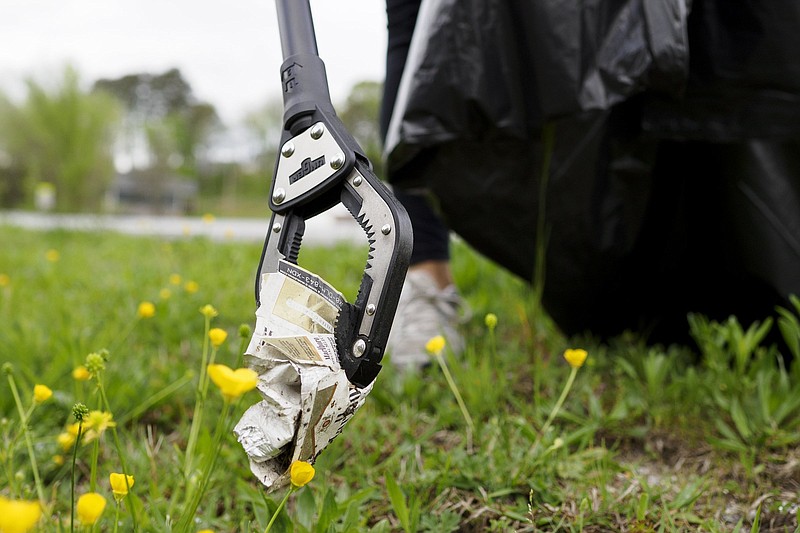Hamilton County leaders have seen an almost 80% increase in trash pickup assignments through the county's alternative sentencing program, which comes several months after the mayor and district attorney pledged to double those numbers in the upcoming fiscal year.
On Jan. 31, District Attorney Coty Wamp and Hamilton County Mayor Weston Wamp, her brother, announced their intention to boost the number of community service assignments and miles of trash collected in fiscal year 2024.
In fiscal year 2022, the county meted out 818 community service assignments covering 3,136 miles. The Wamps aim to exceed 2,000 assignments in fiscal year 2024 — which runs from July 1, 2023, to June 30, 2024 — and bring the number of miles served to 6,000. The push would help certain low-level offenders avoid jail time while also allowing the county to save money on incarceration.
According to numbers provided Thursday by the county, the number of assignments in February, March and April combined stood at 452, which is 79% more than the 252 tallied in November, December and January.
The county also covered more miles in April and May — 495 and 529.5, respectively — than any of the previous nine months. December was the next closest at almost 268 miles. Crews collected more than 13 tons of trash in April, the highest single month total for the period between July 2022 and May 2023.
"I'm proud of these numbers," Coty Wamp said in a phone call Thursday. "I'm really happy to see this and hope we can keep up the progress."
Wamp said she's directed attorneys in her office to consider public work days for low-level offenders in General Sessions Court — those with shoplifting, simple possession or reckless driving charges.
"That would show the state that they're committed to being productive citizens, that they're committed to change, that they regret whatever decision they made," Wamp said.
Her office is also choosing defendants officials believe have a high likelihood of following through with those assignments.
Wamp said the mayor's office has been receiving recurring complaints about litter, and her office was able to implement a solution.
"That's the right kind of partnership," Coty Wamp said. "Somebody has the idea and wants to do it. The other entity gets to actually implement it."
Additionally, Hamilton County expects to see an increase in the amount of money it receives from the Tennessee Department of Transportation for picking up litter on state roads. That could offer more leeway for the county to pick up trash on local routes, which don't carry the same level of reimbursement.
Currently, Hamilton County collects $32 for every mile of state routes cleared. That will increase to $60 per mile starting July 1, resulting in a maximum possible reimbursement for fiscal year 2024 of $536,852. County commissioners will authorize the mayor to seek that funding during their meeting next Wednesday.
(READ MORE: Floating litter collection device installed on Chattanooga Creek)
"That will also allow us to hopefully clean additional areas by putting people on state routes, county routes and city routes," General Services Administrator Christy Cooper said in a phone call.
Before, she said, the county would have to prioritize state roads to maximize the amount of money it received.
"Now we'll be able to spread out a little bit while also making good money off of that state contract," Cooper said. "It's going to be good for the county, good for the city, good for the state."
The county has never hit its maximum possible reimbursement, Cooper said, and it's likely it won't at the new rate. However, the change is still helpful.
The money from the state goes into the budget for the county's alternative sentencing program, Cooper said, supporting compensation for employees and covering the cost of equipment.
For a flat rate of $60,000 a year, Hamilton County also has a contract with Chattanooga to complete trash collection on city roads. The city provides a van and covers the maintenance on the vehicle. The county doesn't receive money for picking up trash on its own roads.
(READ MORE: Amount of Tennessee road litter has fallen 12% since 2016, study says)
"We don't ignore the county routes just because we don't get paid to do them," Cooper told Hamilton County commissioners Wednesday. "Obviously, the more people assigned to the program, the cleaner our county is going to be."
Officials say the pandemic plus changes to drunken driving laws, which removed community service as a mandatory requirement, have spurred a decrease in the number of participants. Now, Cooper said, trash assignments are up to judges and attorneys working out plea agreements.
From day one, Wamp said, her office has been interested in keeping low-level, nonviolent offenders out of prison.
"Countywide, we know that our jail is overcrowded — that is no secret," she said. "We want to make sure that our jail is for our dangerous offenders — those that are a danger to themselves or to the community. That's part of this effort."
"What's more productive to us as a community?" she continued. "To spend $90 a day on them being incarcerated or to have them go and actually serve the community?"
Hamilton County is also trying to offer voluntary days for people to participate in community service. From 9-11 a.m. on June 10, county leaders will hold a spring cleanup at Ooltewah Georgetown Road and Dallas Hollow/Hamby roads. People can sign up on the county website.
Contact David Floyd at dfloyd@timesfreepress.com or 423-757-6249.
